I travelled miles down bumpy dirt tracks in rural Zambia last week in order to meet four Community Health Assistants (CHAs), who are recent graduates from a batch of over 300 health workers trained by the Government of the Republic of Zambia, with funding from DFID through the Clinton Health Access Initiative.
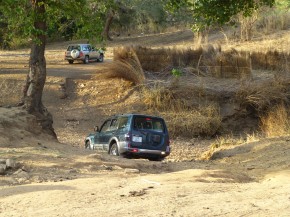
This cadre of health worker is a new addition to the health workforce in Zambia, and a strategically important part of its efforts to overcome critical shortages of doctors, nurses and other health personnel. Zambia’s Community Health Assistant training programme (described here) aims to give people in remote rural areas of the country access to a trained health worker who can promote health, advise communities on disease prevention, and provide a basic range of curative services for common, but potentially life threatening, illnesses such as malaria, pneumonia and diarrhoea.
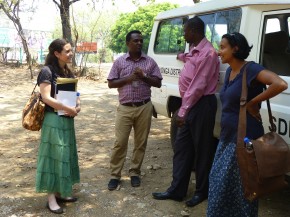
I travelled with Dr. Meena Gandhi, a DFID health adviser in Zambia, Dr Yeko Worku and Katy Bradford Vosburg of the Clinton Health Access Initiative, and a small team from the Ministry of Health to visit the CHAs. (Meena, Yeko and Katy are pictured below with the Deputy Director of Environmental Health from the Ministry of Health).
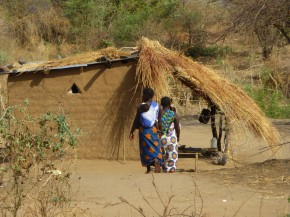
The first stop on our visit was at Siavonga District, not far from the Kariba Dam. It was extremely hot, over 40 degrees, which highlighted one of the challenges the Community Health Assistants will face as they move from house to house delivering health messages and providing basic services.
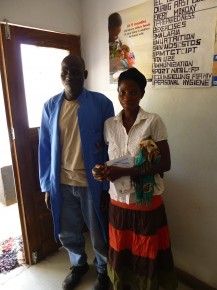
From the district headquarters we travelled to Namoomba village (pictured above) and their health post and met with two of the Community Health Assistants (pictured right). A quick look at the patient register highlighted diarrhoea as a significant problem locally. The CHAs had established that the community’s water source was directly from the Zambezi River (pictured below) rather than from protected wells, and that more than 50% of households still lacked even a basic latrine.
With World Toilet Day having been on 19th November, it is only right that I should highlight a key part of the Community Health Assistant’s job is to review water, sanitation and hygiene practices in the communities they serve. A significant element of the first few months of the CHAs jobs has been to map those houses which have a pit latrine and to promote sanitation and hygiene practices and new latrine construction. There were already some signs of progress, with latrine pits under construction since the CHAs took up their posts.
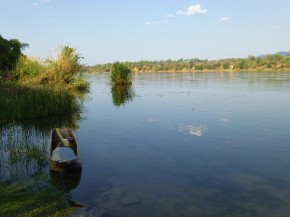
I have posted a picture of the Zambezi River, at the point where it runs by the side of the village, and from where the villagers draw their drinking water, do their washing and bath (despite Hippos).
A key challenge in assessing the impact of the CHA will be the documentation of the services they provide and a demonstration, over time, that these services are helping to reduce the disease burden. For now though, one of the key indicators of success for the programme has been the fact that the communities from which the health assistants were recruited, and to which they have returned, have welcomed their trained health workers back with high expectations for the potential benefits that they might bring over the coming months and years as they become the ‘front line’ of health care provision for these rural communities.
In my next post I will introduce two more health assistants - to highlight some of the challenges that they face.

9 comments
Comment by Anthony posted on
Zambia will never overcome the shortage of medical help, not while people sit on their duffs and ignore the health and food crisis going on. And the sad fact is, that is exactly what people do.
Comment by micheal phiri posted on
why are these people not being paid good money despite them doing a good job.
Comment by Dr Neil Squires posted on
Whilst many community health workers are often recruited as volunteers, the CHW scheme in Zambia is paying those trained, reflecting the fact that those selected enter with school completion certificates and have had a year of training. For the CHWs that I met, the salary given allowed them to establish themselves back in their own communities and to find and build accommodation. The scheme is still fairly new, and once the value of the CHWs has been demonstrated, and the impact that they can make at the community level quantified, it will be much easier for the Ministry of Health to recognise the role that this group of health workers might play in the health service. A key challenge in establishing a health services which operates with very limited resources, is how to make the best use of both human and financial resources in order to achieve the greatest health improvement. This programme in Zambia will aim to answer a number of questions on the effectiveness of CHWs, the Ministry of Health will then be able to look again at the issue of terms and conditions of service as it plans to maximise the health impact for the people of Zambia.
Comment by James posted on
That's awesome post of heath progress. I have impressed to read that post. Thank to share with us.
Comment by Joel Simabwachi posted on
The Community health Assistant's program is a very welcome idea. These cadres are very important. As an Environmental Health Technologist in a rural Area, I strongly welcome the Idea of training Such cadres because much of the practical part of health work at community level is spear headed and completed by them. Most the CHWs face challenges of sharing their personal time with CHW activities due to not being on salary therefore providing highly trained CHAs will dedicate their time to work in the community Health work will bridge the Gap and will surely be an evidence based Intervention.
Comment by Philemon Nambaale posted on
The innovators of this program should be commended as they have made health care easily accessible to the rural poor. I hope to work with CHAs in reducing the disease burden and bring about improved health to the common Zambian.
Comment by LINESS NAKANYIKA posted on
when is the graduation for October 2012- December2013 intake for community health assistant [CHAs] ? .Our work is very tough,hard and sensetive , we really need people to support and encourage us.lt my pleasure to serve in my community in our zambian society.we will be a happy country if we can try and halt these disease that are so deadly but can be prevented at our household level and community level and so happy if our communities accept us ,analyze our role and their role as community members.
Comment by GEORGE BANDA posted on
the delay by the high authority to and the government to employ the second group of CHAs that are waiting for their graduation is sadden as many people in rural Zambia are dying due to ignorance over health matters. May the two ministries put their hands together including the Ministry of finance in making sure that these cadres are sent in rural communities to help the government develop rural communities as their goal. IN Katete district, Kwenje health post Eastern province people are happy with the work these cadres are doing with the government in power. Keep up Zambia
Comment by Mable Bwalya posted on
For Sure when is the zambian government going to start employing these people, especially that are coming from THAME School of excellency, because I have seen that people that have graduated from 2011 to date have not been fused in, despite doing their internship at University Teaching Hospital and Levy Mwanawasa Hospital, please commend.